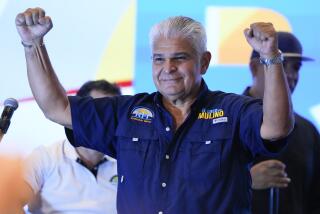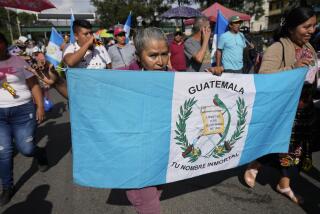Panama President Fails to Oust Noriega, Is Fired : National Assembly Votes to Remove Delvalle After Military Blocks Move Against Strongman
- Share via
PANAMA CITY — President Eric A. Delvalle, Panama’s nominal civilian chief of state, was ousted early today after he tried and failed to fire controversial military strongman Manuel A. Noriega from his post as commander of the nation’s Defense Forces.
In a nationally televised announcement Thursday, Delvalle said that he had removed Gen. Noriega and replaced him with Col. Marcos Justine, chief of staff and second-in-command of the Defense Forces, this country’s sole military and police organization.
But the military establishment quickly closed ranks around Noriega, defying Delvalle’s order, and Justine himself announced that he had rejected a request by Delvalle that he take over the military in Noriega’s place.
Successor to Be Named
In a special session early today, the military-dominated National Assembly voted to depose Delvalle. Presidential Minister Nander Pitti was expected to name a candidate to succeed Delvalle, who would then be approved by the legislature. The new president will be Panama’s sixth in seven years.
The assembly also fired Vice President Roderick L. Esquivel, who had broken with Noriega after Panama’s political crisis began last summer. Although still officially vice president, Esquivel had been physically removed from his office last fall, when soldiers dumped his office furniture on the sidewalk of a busy Panama City street.
Defense Forces troops surrounded Delvalle’s home here Thursday night, placing barricades on the street where he lives. The soldiers prevented reporters from entering the street.
Neighbors said that Delvalle was at home, in the company of close friends. Phone calls to his home got only a recorded message that the line was under repair.
Delvalle’s sharp break with Noriega came in a taped television appearance, in which the president said that earlier this week he had asked Noriega to “voluntarily” step aside.
“I have not had evidence that my suggestion has been accepted,” the president said, adding, “I don’t have any choice but to separate Gen. Noriega from his high post and name Col. Marcos Justine to replace him.”
Delvalle said that he based his decision on a combination of factors, mainly the economic deterioration experienced by Panama during the past several months and the criminal accusations made against Noriega in the United States by federal grand juries that have indicted the strongman for drug trafficking and related offenses.
“Nothing or no one is above the well-being of Panama,” Delvalle declared.
Saying that this country “is living the most difficult and dangerous moment in its history,” Delvalle listed the problems confronting this tiny nation that is the home of the strategic Panama Canal. These include unemployment, inability to pay off foreign debts, continual street disturbances and “damage to the image of Panama.”
Not long after Delvalle’s announcement, however, Panama National Radio, a government-owned station, broadcast a message that “the entire command” of the Defense Forces recognizes Noriega as “the sole commander of the armed institution.”
Justine appeared Thursday night on Channel 2, a military-owned television station, and declared that he had rebuffed Delvalle’s attempt to place him in charge of the armed forces.
“The president called me . . . and told me was going to dismiss Gen. Noriega” and offered me the job of chief of state, Justine said. “I rejected the offer,” he declared. “We have a commander who is Gen. Noriega.”
Justine asserted that Delvalle had decided to try to fire Noriega “under United States pressure.”
Soon after Delvalle’s announcement was broadcast in late afternoon, small crowds gathered in the streets of Panama City’s financial district, waving white handkerchiefs, a gesture that has been a symbol of civilian resistance to Noriega’s rule.
As night fell, the streets of the city began to empty. At the Panama Chamber of Commerce, headquarters of the stiffest civil opposition to Noriega for the past eight months, members hurriedly locked their desks and streamed to their cars.
‘Going to Be Trouble’
“There is going to be trouble. We have to go,” one of them shouted to a reporter.
Soldiers wearing helmets and bearing shields took up positions at several intersections in downtown Panama City, but otherwise there was no unusual movement of troops or security forces.
The headquarters of the U.S. Southern Command at Quarry Heights, not far from downtown Panama City, broadcast a warning on its television network to American military personnel and their families to stay away from sites of previous political demonstrations. The broadcast also put American personnel on “Bravo Alert,” which bars personnel from going into Panama City except on official business or to and from work.
Television Channel 5, a pro-Delvalle station that had been broadcasting normal news interspersed with reports about Delvalle’s actions during the late afternoon, suddenly stopped broadcasting at 8 p.m. without explanation.
Expressions of Support
Meanwhile, on military-owned Channel 2, newscasters read expressions of support for Noriega from individual military units, including the important Battalion 2,000, a unit specially trained to defend the Panama Canal. It has frequently held joint exercises with U.S. troops.
A number of leaders of labor organizations with ties to the Revolutionary Democratic Party also broadcast calls for support for Noriega, and throughout the early evening, politicians belonging to the party telephoned expressions of support to the national radio station, blaming the entire crisis on the United States.
“The president fired himself,” said Marcela Rodriguez, head of a women’s organization within the ruling party, before the assembly’s action. Members of the party had gathered at its downtown headquarters.
Delvalle has just celebrated his 51st birthday. As one of two elected vice presidents, he became president in September, 1985, upon the ouster of President Nicolas Ardito Barletta. Ardito Barletta said he was forced out of office by Noriega because he had planned to investigate the decapitation killing of one of Noriega’s most outspoken critics, Dr. Hugo Spadafora. Spadafora’s beheaded body was found inside Costa Rica, not far from the Panamanian frontier.
Fifth Civilian President
All of Delvalle’s predecessor in recent years had served as little more than figureheads for rule by the military, and few local observers had expected Delvalle to move against Noriega.
But in recent weeks, rumors have circulated here that Delvalle grew increasingly uncomfortable with his role as figurehead president. His wife was reportedly in tears daily. Delvalle, who is a wealthy sugar grower, has long been ostracized from his usual top drawer social circles.
Administration Urging
The Reagan Administration has been calling on Noriega to step down since his indictment by two federal grand juries in Florida on drug-trafficking charges Feb. 5. The indictments portrayed Noriega as a key member of an international drug-trafficking conspiracy.
Demonstrations against Noriega broke out in Panama last June after the military chief’s recently retired second-in-command publicly charged the general with illicit activities ranging from drug trafficking to electoral fraud and the assassination of a political opponent. Noriega has steadfastly maintained that he is innocent.
Delvalle talked to U.S. authorities last week at an unannounced meeting in Miami, and Reagan Administration officials have said that they received discreet inquiries about U.S. willingness to drop federal drug charges against Noriega in exchange for his stepping down.
Delvalle got strong support Thursday from Panama’s ambassador to the United States. The envoy, Juan B. Sosa, said in a telephone interview from his home in Washington: I support Delvalle fully and unequivocally.”
More to Read
Sign up for Essential California
The most important California stories and recommendations in your inbox every morning.
You may occasionally receive promotional content from the Los Angeles Times.













